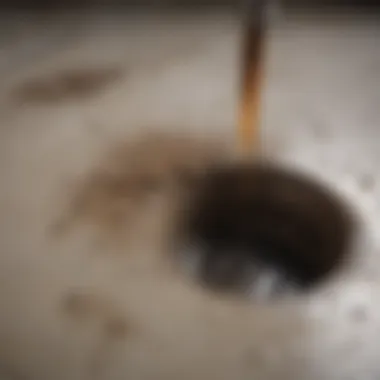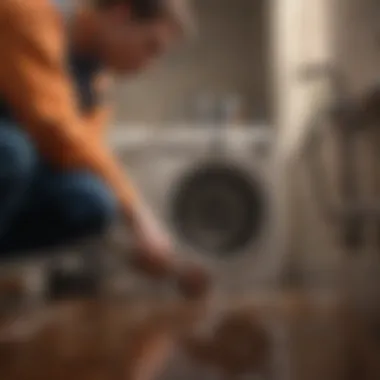Home Remedies to Clean Drains: An Exhaustive Guide


Intro
Clogged drains are a common issue in many households. They can lead to unpleasant odors, slow water drainage, and sometimes more serious plumbing problems. Understanding the causes of clogs is essential for prevention and remedy. Common culprits include grease buildup, hair, soap residue, and food particles. Fortunately, there are effective home remedies that utilize natural ingredients to tackle these stubborn blockages.
This guide will explore various home remedies, discussing their effectiveness, how they work, and the materials needed. From simple solutions using baking soda and vinegar to more specialized approaches involving salt and boiling water, this article will present a wealth of knowledge tailored for homeowners eager to maintain their drains sustainably.
Readers will benefit from detailed, step-by-step instructions for each remedy. Additionally, we will address the science behind these methods, ensuring a comprehensive understanding of why these ingredients are effective in cleaning drains.
By the end of this guide, homeowners will have the necessary tools and knowledge to keep their drains clear without relying on harsh chemicals, thereby promoting a more environmentally friendly household.
The goal is to empower readers, allowing them to address clogging issues effectively while fostering sustainability in their home maintenance practices.
Understanding Drain Clogs
Understanding the intricacies of drain clogs is paramount for any homeowner. The drains in a home play an essential role in maintaining hygiene and ensuring the smooth flow of wastewater. When clogs occur, they can disrupt daily life, lead to extensive inconvenience, and necessitate costly repairs. This section elaborates on the causes and impacts of clogs, providing insights that add value to the remedies presented in this article.
Common Causes of Drain Clogs
Food Residues
Food residues are a significant contributor to drain clogs. Over time, leftover food particles accumulate in pipes and create blockages. Unlike solid waste, food residues can mix with grease and oils, leading to a thick buildup. This characteristic makes it a popular subject when discussing drainage issues. The unique feature of food residues is their organic nature, which may decompose but also attract other materials that worsen the clog. The advantage of understanding this cause is that it allows homeowners to take preventive steps, such as using strainers in sinks and being mindful of what goes down the drain.
Hairdressings and Soaps
Hairdressings and soaps are another major cause of clogged drains. These products often contain ingredients like oils and waxes, which can stick to pipe walls. This stickiness can accumulate hair and other residues, leading to blockages over time. Their widespread use makes this aspect critical in understanding drainage problems. Hairdressings and soaps pose the risk of creating significant buildup, leading to costly plumbing issues. Homeowners benefit from recognizing these materials as potential culprits since they can adjust their habits accordingly, such as cleaning hair in the shower drain regularly.
Mineral Buildup
Mineral buildup is frequently overlooked but is essential in analyzing drain clogs. Hard water can deposit minerals like calcium and magnesium in pipes. This accumulation narrows the passage over time, resulting in slow drainage or even blockages. As a common issue in areas with hard water, it deserves attention. The unique factor about mineral buildup is that it often occurs out of sight, leading to delayed recognition of drainage issues. Homeowners can mitigate this by installing water softeners, which can prevent excessive mineral deposits.
Impact of Clogged Drains
Health Risks
Clogged drains pose serious health risks. Standing water from clogs can become breeding grounds for bacteria and pests. This not only affects hygiene but also increases the potential for waterborne diseases. Homes with chronic drainage issues can experience a significant decline in air quality due to mold and mildew growth. Recognizing this health risk is beneficial, as it emphasizes the importance of regular maintenance to ensure a safe living environment.
Structural Damage
One of the dangerous impacts of clogged drains is structural damage to a home. When water backs up due to a clog, it can seep into walls and foundations, causing extensive damage over time. This characteristic makes structural damage a severe consideration for homeowners. Unlike other problems that may seem more manageable, structural damage can lead to costly repairs and safety hazards. Hence, understanding this impact can motivate homeowners to take preventive actions and address minor clogs before they escalate.
Unpleasant Odors
Unpleasant odors emanating from clogged drains should not be underestimated. Decomposing organic matter trapped in pipes can produce foul smells that permeate living spaces. This issue is detrimental to anyone's comfort in their home, making it a relevant point of discussion. The unique feature of unpleasant odors is that they often serve as a warning sign of deeper issues within the plumbing system. Homeowners should be attentive to such signs, as they provide an opportunity to address minor clogs before they contribute to bigger problems.
"A clogged drain is not just an inconvenience; it’s a sign that preventive measures must be taken."
The sections above outline the importance of understanding drain clogs and their causes, along with the potential impacts. By addressing these elements, the reader gains a clear basis for exploring effective home remedies.
Home Remedies Overview
Home remedies have become a pivotal solution for tackling clogged drains. This section emphasizes the significance of understanding home remedies within the context of drain maintenance. Many homeowners look for accessible, effective solutions that do not require extensive resources. Using natural ingredients not only addresses the issue but often does so in an environmentally friendly way. The ease of application and minimal cost make these remedies an attractive option for many.
Advantages of Home Remedies
Cost-Effectiveness


Cost-effectiveness plays a crucial role in the appeal of home remedies. Using everyday household items, such as baking soda or vinegar, means the expenses are considerably lower than hiring a professional plumber. This feature makes it a beneficial option for those who want to maintain their budget. The unique quality of affordability also encourages regular maintenance, thereby potentially decreasing the frequency of serious plumbing issues in the long run.
Sustainability
Sustainability is another compelling aspect of home remedies. Many common drain-cleaning substances are biodegradable and do not involve harsh chemicals. This characteristic contributes to reducing harmful waste and promotes a healthier environment. By opting for sustainable solutions, homeowners not only improve their drains but also align with environmentally conscious practices. The combination of functionality and eco-friendliness enhances the appeal of these remedies.
Safety for Plumbing Systems
The safety of plumbing systems is critical when considering any maintenance method. Home remedies predominantly use gentle ingredients, which lower the risk of damaging pipes that might be affected by stronger commercial cleaners. This key feature helps maintain the integrity of plumbing systems. Households can effectively clear clogs while avoiding the detrimental effects that chemical cleaners can inflict. The advantage lies in the ability to address common issues without compromising plumbing health.
When to Seek Professional Help
Sometimes, home remedies are not enough. Knowing when to call a professional can save time and prevent more serious issues.
Persistent Clogs
Persistent clogs indicate that a simple fix may not suffice. This aspect is important as it often suggests a deeper issue within the plumbing that may not be resolved through conventional methods. Understanding this situation can save homeowners from endless frustration. Ignoring persistent clogs can lead to greater plumbing challenges and higher costs down the line. It is wise to know when to transition from DIY fixes to professional intervention.
Multiple Problem Areas
Experiencing multiple problem areas within a home’s plumbing suggests a broader issue that needs professional assessment. This characteristic emphasizes that the issue may not be isolated to a single drain. Homeowners should recognize that treating individual clogs may prove ineffective in resolving overarching plumbing problems. This realization helps in making informed decisions regarding when to seek expert assistance.
Signs of Serious Issues
Certain signs can indicate serious plumbing issues. Watching for slow drainage, gurgling noises, or discolored water can be key indicators. This specific aspect is vital, as it points to potential breakdowns or blockages in the main drainage system. Responsible homeowners should prioritize these observations. Quick action in the face of serious signals can prevent extensive and costly repairs later.
Understanding these distinctions is essential for effective drain management and maintenance.
Effective Home Remedies
The section on Effective Home Remedies is central to understanding how to approach drain cleaning naturally. Many homeowners seek methods that are both safe and effective without relying on harsh chemicals. Employing home remedies can be practical, accessible, and environmentally friendly. Therefore, it is crucial to explore various techniques that can clear clogs effectively while promoting sustainability.
Baking Soda and Vinegar Method
Ingredients Needed
The primary ingredients for the baking soda and vinegar method are straightforward: one cup of baking soda and one cup of vinegar. Baking soda is a mildly alkaline compound, while vinegar is acidic. The reaction between these two substances creates carbon dioxide gas, which can help to dislodge debris in the pipes. This combination makes these ingredients popular and effective options for drain cleaning in households. It is a non-toxic solution, making it suitable for regular use without harming the plumbing system.
Step-by-Step Instructions
To use this method effectively, follow these steps:
- Pour one cup of baking soda into the drain.
- Add one cup of vinegar and cover the drain with a cloth.
- Wait for about 30 minutes.
- Flush the drain with hot water.
These instructions provide a clear pathway to clearing minor clogs. It is beneficial due to its simplicity and the minimal preparation required. The method is quite popular due to its effectiveness without complicated procedures.
Expected Results
After following this remedy, the expected results typically include a clear drain, eliminating minor clogs and odors. The reaction should break down some buildup in the pipes. However, it is important to note that while this method works well for minor blockages, it might not be sufficient for severe clogs. Therefore, it serves best as a regular maintenance strategy rather than a solution for major issues.
Salt and Water Solution
Preparation Steps
To create the salt and water solution, gather half a cup of table salt and two cups of boiling water. The salt works by dissolving greasy residues, while boiling water helps to melt down and flush away debris. The preparation is straightforward, making it a quick solution for homeowners seeking immediate results.


Application Techniques
Pour the salt directly into the drain followed by the boiling water. This should be done carefully to avoid burns. Allow it to sit for several minutes before rinsing thoroughly with hot water. This technique can be highly effective when dealing with greasy buildups or minor clogs.
Effectiveness Analysis
The effectiveness of this remedy lies in its simplicity and accessibility. Salt is readily available in most kitchens, and the method is quick. It may not work as effectively against solid clogs, but as a preventive measure, it is highly valuable, especially for maintaining flow in kitchen drains.
Boiling Water Method
How to Use Boiling Water
To apply the boiling water method, simply heat water until it reaches a rolling boil. Once ready, carefully pour the boiling water directly down the drain. This method is effective for dissolving soap scum, oils, and food remnants. By regularly using boiling water, homeowners can prevent some clogs from forming in the first place.
Limitations
Although boiling water is a powerful tool for clearing drains, it does have limitations. For example, it should not be used in PVC pipes, as it can cause damage due to high temperatures. Additionally, this method might not work well for more persistent clogs, particularly those caused by solid materials.
Effective Scenarios
Boiling water works best in situations where greasy residues or soap scum are the main culprits. It is also effective for regular maintenance. Using it in combination with other methods can enhance overall effectiveness when faced with stubborn blockages.
Dish Soap and Hot Water
Mixing Ratio
To prepare this remedy, mix a few tablespoons of dish soap with hot water. The dish soap acts as a lubricant to help break down grease, while hot water facilitates the process. The mixing ratio is simple and allows for flexibility depending on the sink's condition.
Application Process
Pour the soapy water slowly down the drain. Wait for a brief period before flushing with hot water. This technique is particularly effective in kitchen sinks where fat or oil buildup is common.
Additional Tips
For optimal results, consider using a degreasing dish soap, as it can enhance the effectiveness against stubborn buildup. Regular use of this method can help maintain clear drains and minimize future clogs.
Using a Plunger
Selecting the Right Plunger
Choosing the right plunger is essential for the effectiveness of this method. A flange plunger is ideal for sinks, while a cup plunger works best for toilets. Selecting the correct type enhances efficiency and ensures that the method is effective.
Plunging Techniques
To use a plunger effectively, ensure a seal around the drain and plunge using quick, forceful motions. This action creates pressure waves that can break up clogs. It requires some practice to perfect the technique, but when done correctly, it can be very effective.
Safety Considerations
While plunging, exercise caution to avoid spilling any debris. Wearing gloves can protect hands from bacteria. It is also essential not to use excessive force, as this could damage pipes, especially older plumbing systems.
Remember: Regular maintenance can significantly reduce the number of clogs you experience, ensuring that your drains remain in good condition.
Maintaining Clear Drains
Maintaining clear drains is crucial for a harmonious home environment. A well-functioning drainage system prevents a host of issues, including unpleasant odors, health hazards, and expensive repairs. Regular upkeep is necessary to avoid the buildup of materials that lead to clogs. It does not only help in keeping the drains free flowing, but also extends the life of the plumbing system. Homeowners should prioritize drain maintenance to enhance the longevity and functionality of their spaces.


Preventive Tips
Regular Cleaning Routines
Establishing regular cleaning routines for your drains is an effective way to prevent blockages. This practice involves scheduled cleanings using simple tools or home remedies to remove potential clogging materials before they accumulate. One key characteristic of regular cleaning is its proactive nature, as it addressesissues before they can worsen. This approach is beneficial because it saves time and money by minimizing the chances of severe plumbing problems.
However, it is important to note that regular cleaning requires consistency. Lazy habits can quickly turn a routine into a sporadic effort, leading to avoidable complications. Thus, sticking to a schedule is vital for success.
Using Drain Screens
Utilizing drain screens is a practical measure to maintain clear drains. These screens act as barriers against larger debris, such as hair, food particles, and other waste material. The key characteristic of drain screens is their simple installation, making them accessible for anyone to use without professional assistance. They are a popular choice among homeowners as they significantly reduce the frequency of clogs, ultimately saving on repair costs.
One unique feature of drain screens is their reusable nature. They can be easily cleaned and utilized repeatedly, making them a sustainable choice. A potential disadvantage, however, is that they may not stop smaller particles from going down the drain, which could still lead to gradual buildup over time.
Mindful Waste Disposal
Mindful waste disposal plays a significant role in maintaining clear drains. This practice involves being conscious of what goes down the sink and toilet. One of the key features of mindful waste disposal is the awareness it promotes. Homeowners become more careful about disposing of items like grease, coffee grounds, or large food scraps, which can lead to clogs.
Choosing to practice mindful disposal is evidently beneficial; it encourages sustainability and longevity of plumbing systems. However, the challenge lies in habit formation. Getting used to disposing of waste correctly might take time and effort but can lead to long-term rewards.
Natural Drain Cleaners
Natural drain cleaners offer an eco-friendly approach to maintaining clear drains without introducing harsh chemicals into your home. This segment will explore the benefits and characteristics of enzyme-based products, homemade solutions, and commercial alternatives.
Enzyme-Based Products
Enzyme-based products are designed to break down organic materials that cause clogs. These cleaners contain natural enzymes that effectively target and digest debris without harming plumbing. One key characteristic is their gentle yet effective cleaning action. They are a popular choice among environmentally-conscious homeowners who prefer sustainable solutions.
A unique aspect of enzyme cleaners is their long-lasting effect. Unlike some harsh chemicals, they continue to work as long as they are present in the system. However, one disadvantage is the time required for them to take effect. They may not provide immediate results when compared to conventional drain cleaners.
Homemade Solutions
Homemade solutions offer an economical and sustainable option for drain maintenance. Common ingredients include baking soda, vinegar, and salt. By utilizing easily accessible items, homeowners can create effective cleaners without the need for chemical alternatives. The key characteristic of homemade solutions is their versatility and simplicity. These remedies can be tailored to specific clog types.
The advantage of this approach is the ability to control what enters your drain system. However, it is crucial to understand that effectiveness can vary based on the severity of the clog. In some cases, more persistent blockages may require alternative methods.
Commercial Alternatives
Commercial alternatives provide a ready-to-use option for those who prefer convenience over DIY methods. Many products available in stores are specifically formulated to tackle tough clogs. The main characteristic of these products is their availability in a range of strengths and applications. Homeowners find these products effective and time-saving when faced with severe drain issues.
A unique feature is the variety that suits different drain types and situations. However, one should exercise caution as some products may contain chemicals that could damage plumbing if used excessively. It is essential to follow the manufacturer instructions to prevent any potential harm.
Maintaining clear drains involves understanding each aspect of care. By integrating effective preventive tips and natural solutions, homeowners can significantly improve their drainage systems' functionality and health.
Epilogue
In summarizing the significance of home remedies for drain cleaning, it is vital to recognize their multiple benefits. First, these remedies provide a practical solution to a common household issue without relying on harsh chemicals that could harm plumbing or the environment. This characteristic aligns perfectly with the growing trend toward sustainable living, where natural alternatives are sought after.
Moreover, understanding the methods discussed throughout this article deepens the reader's knowledge about maintaining effective drainage systems. Each remedy carries its own merits, whether it’s the ease of using basic household items or the enhanced safety for both users and plumbing systems.
For those who are facing potential plumbing issues, these home remedies act as a first line of defense. They often prevent the need for professional intervention, saving both time and money. However, it is crucial to be aware of the limitations of these solutions and seek professional help when necessary, especially in persistent or severe cases.
By choosing natural solutions, homeowners contribute to a more sustainable way of living and demonstrate responsibility towards their surroundings and health.
Summary of Key Points
- Accessibility of Remedies: Many effective drain cleaning solutions can be found right in your kitchen.
- Preventive Maintenance: Regular application of home remedies can thwart future clogs.
- Environmental Responsibility: These methods emphasize minimal impact on the environment.
- Cost-Effectiveness: Using household items reduces reliance on expensive commercial products.
- Health and Safety: Natural ingredients ensure safer practices in your home.
Encouragement for Sustainable Practices
Embracing sustainability in everyday cleaning habits contributes not just to personal convenience but also positively impacts the environment. As the trend toward eco-friendly solutions grows, homeowners should consider regularly using natural remedies.
- Routine Use: Make it a habit to apply these methods periodically to maintain clear drains.
- Educate Others: Share insights about these remedies with friends and family, fostering a community that values sustainability.
- Explore More Options: Delve into other natural cleaning methods that can improve household cleanliness without environmental ramifications.







